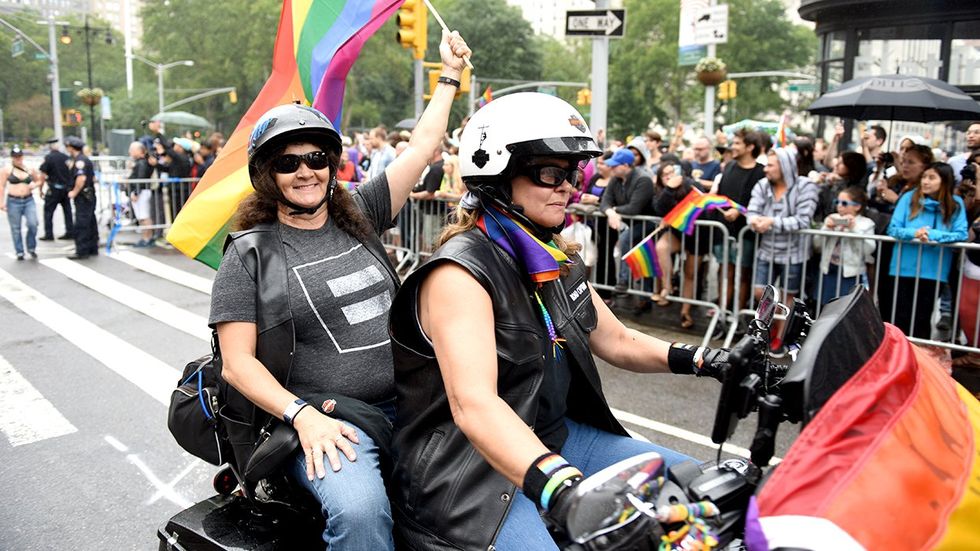The nation’s blue state-red state divide shows up sharply in the Human Rights Campaign’s 2023 State Equality Index, released Tuesday morning, with many states squarely in the pro-LGBTQ+ rights camp, about as many just the opposite, and few in the middle.
Keep up with the latest in LGBTQ+ news and politics. Sign up for The Advocate's email newsletter.
The HRC Foundation (HRC’s educational arm), in partnership with the Equality Federation — a network of state-based LGBTQ+ advocacy organizations — assessed the LGBTQ+ rights records of all 50 states and the District of Columbia. The assessment included looks at nondiscrimination laws, relationship recognition, hate-crimes statutes, laws affecting young people, and more.
"Last year was the most damaging and destructive legislative session we have ever seen for the LGBTQ+ community - particularly transgender youth. This year, sadly, we expect more of the same," Kelley Robinson, the president of HRC said in a release. "But these attacks are out of touch with the American people – and they are a losing political strategy. We are the majority, and we will not stop until we are setting new records in support of LGBTQ+ people in every corner of the country."
Twenty states, the same number as the previous year, plus D.C., placed in the highest-rated category, “Working Toward Innovative Equality”: California, Maine, New York, Colorado, Nevada, Minnesota, New Jersey, Oregon, Illinois, Massachusetts, Connecticut, Vermont, Maryland, Washington, Delaware, Hawaii, New Hampshire, Rhode Island, New Mexico, and Virginia.
Five states placed in the next category, “Solidifying Equality”: Michigan, Alaska, Wisconsin, Iowa, and Pennsylvania. Two were in the category “Building Equality”: Utah and Arizona.
Twenty-three states were in the lowest-rated category, “High Priority to Achieve Basic Equality”: Indiana, Ohio, Kentucky, Kansas, Nebraska, North Dakota, Missouri, West Virginia, North Carolina, Montana, Georgia, Florida, Wyoming, Louisiana, Texas, Idaho, South Carolina, Mississippi, South Dakota, Oklahoma, Tennessee, Arkansas, and Alabama.
Although 2023 was the worst year on record for anti-LGBTQ+ state legislation, a few states saw notable progress. Michigan, which was in the lowest category in the 2022 report, moved up because of major LGBTQ+ rights bills passed and signed into law by Democratic Gov. Gretchen Whitmer in 2023. One amended the state’s Elliott-Larsen Civil Rights Act to ban discrimination based on sexual orientation and gender identity.
“That was an effort that had been several decades in the making,” Cathryn Oakley, HRC’s senior director for legal policy, tells The Advocate.
Another bill that became law in Michigan last year barred licensed therapists from subjecting minors to conversion therapy, the discredited and harmful practice of trying to turn LGBTQ+ people straight or cisgender. The advances in the state were made possible in large part by Democratic control of both houses of the legislature and the governor’s office, Oakley notes.
Arizona also progressed, moving up from the lowest category into “Building Equality.” The state still lacks an LGBTQ-inclusive nondiscrimination law covering private businesses, but in one of her first acts after being sworn into office in January 2023, Democratic Gov. Katie Hobbs issued an executive order protecting state employees and contractors from anti-LGBTQ+ discrimination. Hobbs, who succeeded Republican Doug Ducey, has helped stop anti-LGBTQ+ legislation as well, Oakley says.
Utah, Kentucky, and North Dakota all moved down a category due to homophobic and transphobic legislation. All passed bans on gender-affirming care for transgender minors, and other major bills passed into law included Kentucky’s version of “don’t say gay” and, in North Dakota, an anti-trans “bathroom bill” and one requiring school staffers to out trans students to their parents.
Nationwide, 2023 was the worst year on record for anti-LGBTQ+ state legislation, with more than 550 such bills introduced across 43 states and more than 80 passed into law. 2024 is on track to be at least as bad, Oakley says. Legislatures in 36 states are in session so far, with 325 anti-LGBTQ+ bills introduced, by HRC’s latest count. Many of them are specifically anti-trans, as was the case last year. 2024 opened with Ohio lawmakers overriding Gov. Mike DeWine’s veto of a ban on gender-affirming treatment for trans youth and restrictions on their participation in school sports, plus the proposal of rules under which state agencies would make it more difficult for both trans youth and adults to get the medical care they need.
Oakley attributes the rash of anti-trans bills to the fact that right-wing politicians have lost on so many other LGBTQ+ rights issues, including marriage equality. “Our opponents are running out of issues that are galvanizing to their base. … They needed a new issue, and they settled on trans kids,” she says.
These legislative attacks are popular only with the far right, not the general electorate, according to Oakley and other HRC officials, so it’s time for those who oppose such legislation to make their voices heard. “This is a moment when people absolutely have to get off the sidelines,” Oakley says.














































































